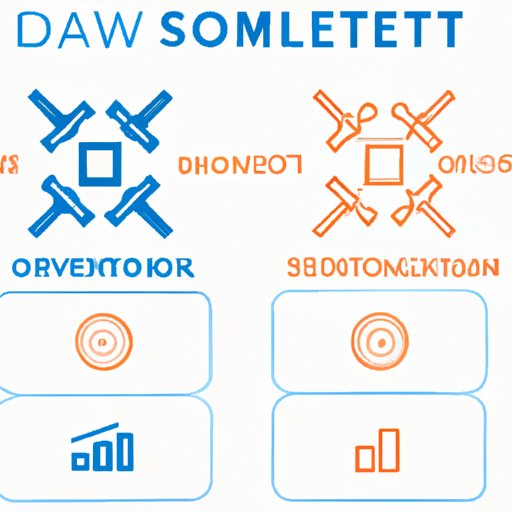Introduction
Business development and sales are two terms that often get used interchangeably, but there are distinct differences between them. While both are essential to the success of any organization, they have different objectives, strategies, and required skill sets. This article will explore the fundamentals of business development and sales, breaking down the differences between them, and providing an overview of what each role entails.
Exploring the Fundamentals: A Comparison of Business Development and Sales
Before we dive into the differences between business development and sales, let’s first define each term. Business development is the process of identifying, creating, and capitalizing on new opportunities for growth. It is focused on finding ways to expand existing products or services, as well as creating new ones. Sales, on the other hand, is the process of persuading potential customers to purchase a product or service. It involves negotiating deals, building relationships, and closing transactions.
Overview of Business Development
Business development professionals focus on finding ways to expand the reach of a company and increase its profits. This includes activities such as market research, strategic planning, and developing partnerships with outside organizations. Business development professionals also identify new markets for products and services, as well as develop strategies for entering those markets. They must be adept at problem solving and have a deep understanding of the company’s core offerings and customer base.
Overview of Sales
Sales professionals are responsible for generating revenue by convincing potential customers to purchase a product or service. This requires them to be adept at communication skills, such as public speaking, networking, and negotiation. Sales professionals must also understand the company’s products and services in order to effectively communicate their value to potential buyers. Additionally, they must possess the ability to build relationships and trust with customers, as well as the tenacity to close deals.
Similarities between Business Development and Sales
Although business development and sales have distinct differences, they also share some commonalities. Both roles require an understanding of the company’s core offerings and target markets. Additionally, both roles involve building relationships with external stakeholders and leveraging those relationships to drive revenue. Finally, both roles require strong communication skills, problem-solving abilities, and an aptitude for learning.

Breaking Down the Difference: How Business Development Differs from Sales
Now that we’ve explored the similarities between business development and sales, let’s take a deeper look at how they differ. The following sections will outline the different goals and strategies used in each role.
Different Goals between Business Development and Sales
The primary goal of business development is to create new opportunities for growth, while the primary goal of sales is to generate revenue through transactions. Business development is focused on the long-term, while sales is focused on the short-term. Additionally, business development is focused on finding new markets and customers, while sales is focused on cultivating existing relationships and closing deals.
Different Strategies Used in Business Development and Sales
When it comes to strategies, business development and sales differ significantly. Business development professionals often use strategies such as market research, competitive analysis, and strategic partnerships to identify new opportunities for growth. Meanwhile, sales professionals typically employ strategies such as cold calling, networking, and lead nurturing to generate revenue. Additionally, business development professionals may use tactics such as pricing discounts and promotions to gain an edge in the market, while sales professionals rely on persuasive techniques to close deals.
An Overview of Business Development vs. Sales: What Do They Do?
Now that we’ve discussed the goals and strategies behind business development and sales, let’s take a look at the day-to-day tasks involved in each role.
What are the tasks for Business Development Professionals?
Business development professionals are tasked with identifying new opportunities for growth and developing strategies to capitalize on those opportunities. This often involves researching markets, analyzing competitors, and establishing partnerships. Additionally, business development professionals must be adept at problem-solving and decision-making, as they are often responsible for identifying solutions to challenges faced by the company.
What are the tasks for Sales Professionals?
Sales professionals are responsible for driving revenue through sales transactions. This involves activities such as prospecting leads, negotiating deals, and maintaining relationships with existing customers. Sales professionals must also be adept at communication, as they must be able to effectively explain the value of the company’s products and services to potential buyers. Additionally, sales professionals must possess the ability to persuade and influence others in order to close deals.

A Look at the Goals and Strategies Behind Business Development and Sales
Now that we’ve outlined the tasks associated with business development and sales, let’s take a look at the goals and strategies behind each role.
What are the Goals of Business Development?
The primary goal of business development is to create new opportunities for growth. This involves activities such as market research, competitive analysis, and strategic partnerships. Additionally, business development professionals must be adept at problem-solving and decision-making, as they are often responsible for identifying solutions to challenges faced by the company.
What are the Goals of Sales?
The primary goal of sales is to generate revenue through sales transactions. This involves activities such as prospecting leads, negotiating deals, and maintaining relationships with existing customers. Sales professionals must also be adept at communication, as they must be able to effectively explain the value of the company’s products and services to potential buyers.
What Strategies are Used by Business Development Professionals?
Business development professionals often use strategies such as market research, competitive analysis, and strategic partnerships to identify new opportunities for growth. Additionally, they may use tactics such as pricing discounts and promotions to gain an edge in the market.
What Strategies are Used by Sales Professionals?
Sales professionals typically employ strategies such as cold calling, networking, and lead nurturing to generate revenue. Additionally, they rely on persuasive techniques to close deals.

The Essential Skills for Business Development and Sales Professionals
In addition to having different goals and strategies, business development and sales professionals require different skill sets. The following section outlines the key skills needed for each role.
Key Skills Needed for Business Development Professionals
Business development professionals must possess a deep understanding of the company’s core offerings and target markets. Additionally, they must be adept at problem-solving and decision-making, as well as have strong communication and negotiation skills. Other important skills include market research, competitive analysis, and strategic planning.
Key Skills Needed for Sales Professionals
Sales professionals must possess strong communication skills, such as public speaking, networking, and negotiation. Additionally, they must understand the company’s products and services in order to effectively communicate their value to potential buyers. Other important skills include relationship-building, lead generation, and deal-closing.
Conclusion
Business development and sales are two distinct roles that are essential to the success of any organization. Although there are similarities between the two roles, there are also key differences. Business development is focused on creating new opportunities for growth, while sales is focused on generating revenue through transactions. Additionally, business development and sales professionals require different skillsets and employ different strategies. Understanding the distinction between business development and sales can help organizations maximize their potential and achieve their goals.
(Note: Is this article not meeting your expectations? Do you have knowledge or insights to share? Unlock new opportunities and expand your reach by joining our authors team. Click Registration to join us and share your expertise with our readers.)
